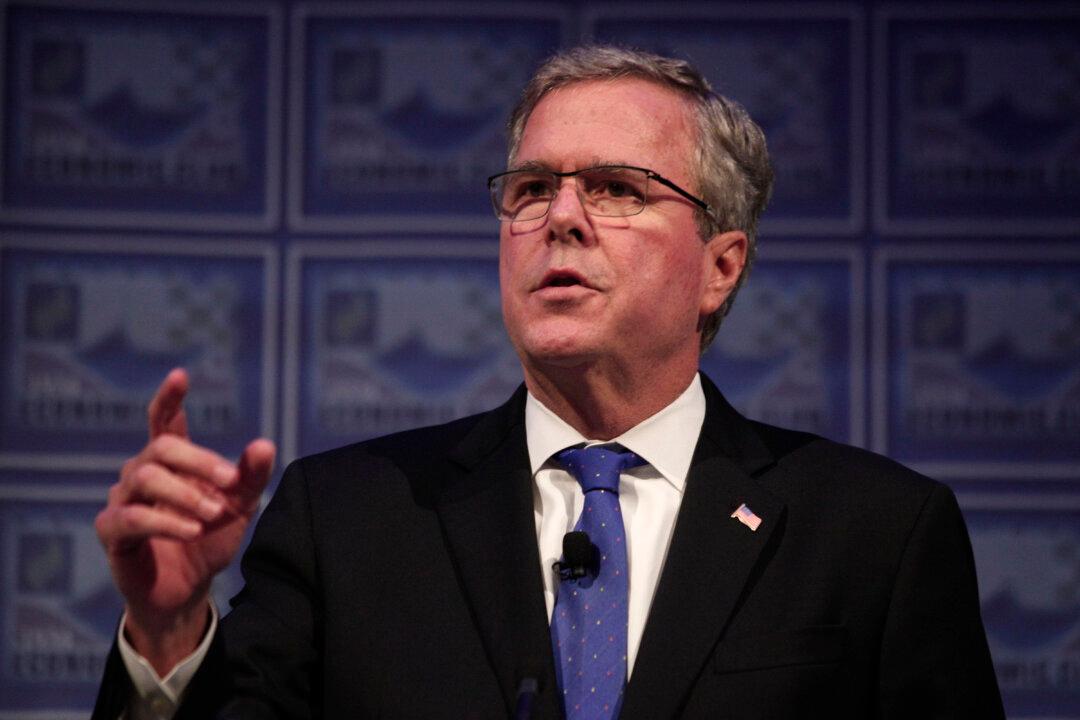COLUMBIA, S.C.—Former President George W. Bush was making his first direct foray into the 2016 campaign Monday in South Carolina, hoping a state that put him on the path to the White House 16 years ago can do the same for his brother, Jeb.
The younger Bush’s decision to put the former president front-and-center underscores his tenuous position in a race he was once expected to dominate. Bush is seeking to trade on his family’s popularity in South Carolina, even if that means reviving his brother’s complicated legacy and reminding voters eager to break with the political establishment that he'd be the third Bush to serve as president.
“The Bush family is beloved,” South Carolina Sen. Lindsey Graham said Monday. Graham joined the former president and wife, Laura, at an American Legion Post in Columbia, where they greeted the crowd before traveling to Charleston for an evening rally.
[aolvideo src=“http://pshared.5min.com/Scripts/PlayerSeed.js?sid=1759&width=580&height=356&playList=519501449&responsive=false&pgType=console&pgTypeId=discovery-videoDetails-grabCodeBtn”]
Presidents George W. Bush and George H.W. Bush each won two Republican primaries in South Carolina, and their family retains deep social and political ties here. But in the turbulent 2016 race, the state appears to be Donald Trump’s to lose.
On Monday, the billionaire seemed intent on overshadowing Bush’s return to presidential politics. Trump added events in Charleston, including a news conference where he repeatedly noted that “the Word Trade Center came down during the reign of George Bush.”
“If the ex-president is campaigning for his brother, I think he’s probably open to great scrutiny, maybe things that haven’t been thought of in the past,” Trump told reporters.
Supporters of Ohio Gov. John Kasich, another Republican presidential candidate, suggested Jeb was now a fair target. South Carolina State Rep. Gary Clary took aim at Bush’s economic record, noting that Kasich helped forge a balanced budget while serving in Congress and working with Democratic President Bill Clinton.
“He handed it off to President George W. Bush who proceeded to increase federal spending by an astonishing 83 percent over his two terms,” Clary said.
[morearticles]1966536, 1966999[/morearticles]
While Trump has dished out biting critiques against nearly all his rivals, he seems to delight particularly in targeting Bush. The former Florida governor was initially unnerved by the attacks, but he’s grown more comfortable taking on the brash real estate mogul and has relished in being one of the few GOP candidates willing to do so.
“I could care less about the insults that Donald Trump gives to me. It’s blood sport for him,” Bush said during Saturday’s GOP debate. “I am sick and tired of him going after my family.”
Despite his deep loyalty to his family, Bush has struggled with what role they should play in his campaign, particularly his brother. The 43rd president left office deeply unpopular with a nation fatigued by the Iraq War and angry over his botched response to Hurricane Katrina.
Since leaving the White House in early 2008, Bush has kept a low profile. He retreated to his home state of Texas, where he picked up painting and delved into work on his presidential library, public health projects in Africa, and events for wounded military service members.
Friends say he’s remained engaged in his brother’s campaign behind the scenes and like their father, has struggled to comprehend how Trump has taken command of a party he once led.
With Jeb Bush’s opportunities to revive his campaign dwindling, the family is taking a more active role.
[morearticles]1957635, 1965866[/morearticles]
Family matriarch Barbara Bush had hit the campaign trail in New Hampshire, delighting voters with her outspoken style and tenacity, as the 90-year-old traipsed through snow to get to events. Her elderly husband is too frail to campaign, but has sent fundraising emails on his son’s behalf.
Bush’s campaign knows there are risks in wrapping the candidate in his family’s deep political history. Trump’s unexpected rise has underscored the public’s frustration with Republican Party leaders and anyone considered part of the political establishment.
But perhaps with little left to lose, Bush seems to be growing not just tolerant of his family’s long shadow, but also comfortable with it.
Asked during a town hall event in New Hampshire how he could try to distinguish himself from people reluctant to see a third Bush to serve as president, he said simply, “People are just going to have to get over it.”





